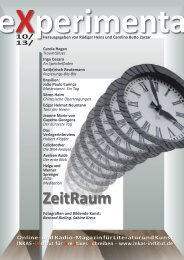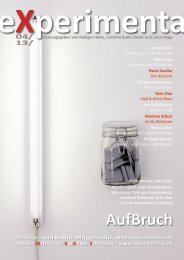Download der aktuellen Ausgabe (Einzelseiten) - Experimenta.de
Download der aktuellen Ausgabe (Einzelseiten) - Experimenta.de
Download der aktuellen Ausgabe (Einzelseiten) - Experimenta.de
Sie wollen auch ein ePaper? Erhöhen Sie die Reichweite Ihrer Titel.
YUMPU macht aus Druck-PDFs automatisch weboptimierte ePaper, die Google liebt.
activists and completely baffled the old dictators and their stooges, who simply didn’t know how<br />
to counter this new <strong>de</strong>mocratic space. I have spoken to people from Saudi Arabia who told me<br />
that every time the (unelected) government tries to suppress online communication, the number of<br />
people making their voices heard online increases. But the Arab Spring happened, not because<br />
people had the Internet and mobile phones, but because they were driven to exasperation by<br />
regimes that treated them with contempt.<br />
Rachid Filali: Is the wi<strong>de</strong>spread use of social networks (in<br />
Europe and America in particular) caused by the search for<br />
a replacement of the „extreme individualism“ suffered by<br />
Westerners in general?<br />
Stephen Coleman: The grandparents of the Facebook<br />
generation had fewer social contacts than their grandchildren,<br />
but knew them better. Online social networks create what<br />
Granovetter called ‘weak ties’. I wouldn’t like to categorise<br />
networked sociality as a retreat to lonely individualism or a<br />
turn towards more collective engagement. It is both – and<br />
the empirical question is to i<strong>de</strong>ntify where and when and how<br />
one kind of relationship is more dominant than the other. The<br />
crisis of Western individualism is <strong>de</strong>eper and more profound<br />
than can be explained by the use of technological tools. (Most<br />
people in the West feel that they have little influence on the<br />
world around them, leaving them as spectators upon political<br />
dramas in which they’re told, according to <strong>de</strong>mocratic i<strong>de</strong>als,<br />
that they should be centre stage).<br />
Rachid Filali: Do you expect the <strong>de</strong>mise of „the printed press,“<br />
after the huge success of „electronic media“?<br />
Stephen Coleman: No – but some print dinosaurs will fall by<br />
the waysi<strong>de</strong>, while others will adapt. I like the i<strong>de</strong>a of a media<br />
ecology in which different media serve specific socio-cultural<br />
needs. We’re doing some empirical work on this currently in the<br />
city of Leeds, where my University is based.<br />
Rachid Filali: We can notice a strange phenomenon nowadays.<br />
Is it true that while the „printed press“ in the Arab world is<br />
successful, the opposite happens in Europe and in America, as<br />
it is threatened with bankruptcy?<br />
www.eXperimenta.<strong>de</strong><br />
Rachid Filali was born in Algeria in 1964, working<br />
in journalism since 1985. Filali is a researcher in<br />
linguistics, and is fluent in a number of languages:<br />
English, Arabic, French, German, Chinese, and<br />
Japanese. Rachid expresses his views of the universe<br />
and life in his first collection of poetry published in<br />
2007, and the second book will be published this<br />
year 2013. He has published two books about<br />
world literature, as he also is interested in writing<br />
for children. He currently collaborates with a number<br />
of Arab and foreign magazines )Knot Magazine,<br />
Oudnad Magazine, Al Faisal Magazine, eXperimenta<br />
Magazin… and works as “corrector and reviser” for<br />
the newspaper ELKHABA-ELRIADI الخبر الرياضي<br />
Stephen Coleman: Yes, in<strong>de</strong>ed this is the case. Much of the commentary and scholarship<br />
about the media is very Euro-American-centered. This is an important remin<strong><strong>de</strong>r</strong>.<br />
Rachid Filali: There are a lot of fake news published by the press in many countries of the world,<br />
especially in the press that is financially and politically supported by companies and influential<br />
personalities. How to protect the truth of these evil forces?<br />
Stephen Coleman: See this article: http://xa.yimg.com/kq/groups/1946698/68514667/name/<br />
Television%20%26amp%3B%20New%20Media%20-%20Murdoch%20-%20Coleman.doc.pdf<br />
Rachid Filali: How do you analyse what is currently happening in the Arab world including<br />
changes in political, social and cultural areas?<br />
Stephen Coleman: I’m a <strong>de</strong>mocrat who believes that the work of building <strong>de</strong>mocracy is never<br />
completely finished. The Arab Spring was an inspirational phenomenon. It is too easy to forget<br />
28 Juni 2013
















